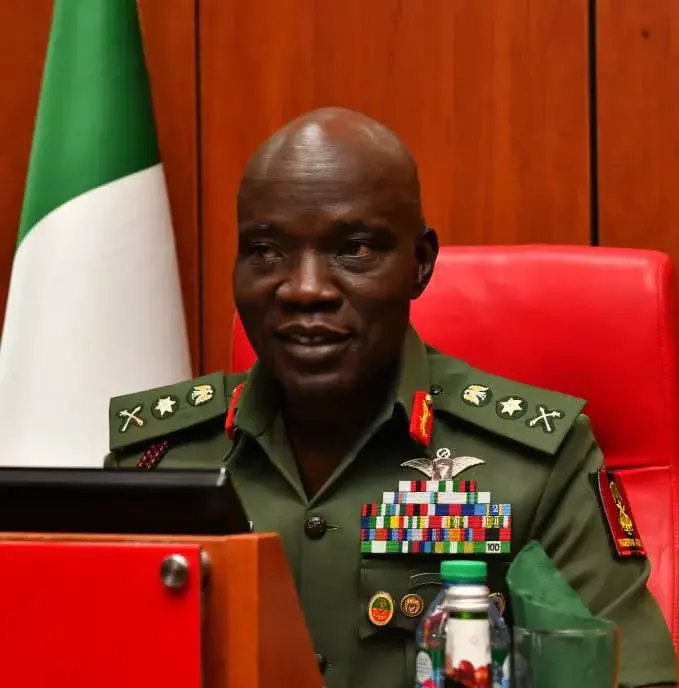Lt.-Gen. Taoreed Lagbaja, the Chief of Army Staff, has announced that the Nigerian Army has procured electronic warfare capabilities and is making use of the amalgamation of electronic and cyber warfare to its advantage.
This was disclosed by Lagbaja on Monday in Abuja during the inauguration of the Nigerian Army Cyber Warfare School’s inaugural Cyber Security Workshop.
The News Agency of Nigeria reports that the theme of the workshop is, ‘Role of Information Technology to national security against upcoming threats and cyber-attacks.’
Maj.-Gen. Sanusi Dahiru, standing in for the Deputy Director-General of the Nigerian Army Heritage and Future Centre, expressed Lagbaja’s acknowledgment of the Nigerian Army’s previous limited progress in the acquisition of electronic warfare capabilities.
Pointing out that the constraint was mainly a result of the costly nature of equipment and the army’s limited technical expertise, he affirmed that this challenge has now been conquered.
‘This is because ICT networks are also dependent upon the myriad properties of the Electro Magnetic Spectrum for their essential connectivity in cyberspace, an environment where a number of actors operate to create exponential effects when compared to other domains.’
‘I therefore urge the school to hold and expand this collaboration until we find the ability to play the role of second eleven in this field.’
‘The workshop should not only focus on cybersecurity but should include cyber warfare, as this will equip the Nigerian Army with expertise and knowledge of integrating cybersecurity into military doctrine and tactics as well as exploring the role of cyber warfare in contemporary military operations,’ he said.
Addressing the complexity of cyber threats, Lagbaja pointed out that they could emanate from various sources, such as foreign organizations, hacktivists, governments, criminal groups, and individuals.
He highlighted that cyber-attacks were increasingly concentrating on critical infrastructure like power grids, financial systems, healthcare organizations, and government networks.
Elaborating on this, he emphasized that Nigeria, similar to other modern societies, heavily leaned on cyberspace for its activities, as it had turned into an emerging theater of operations and would undeniably be contested in future conflicts.
‘It is for this reason that the Nigerian Army Cyber Warfare Command (NACWC) and NACWS were established to curb the threats posed by this domain.’
Read also: Report Of Troops’ Inadequate Feeding Prompt Army Probe
‘We therefore need to rally around to ensure this initiative is effective and efficient, besides the need to protect the huge investments made so far.’
‘I am particularly pleased with the drive of the school in using its tools not only as a means of academic excellence but as a viable means of proffering solutions to contemporary and future security challenges which is in line with the sustainment of my command philosophy for the Nigerian Army.’
‘For all the participants, you must use this singular opportunity to learn as much as you can, open up new vistas and perspectives so that we can achieve landmark results for the army and the nation at large,’ he said.
The Chief of Army Staff expressed gratitude to President Bola Tinubu for his support and assured that the army would persist in remaining nonpartisan, proficient, and consistently prepared to fulfill assigned tasks within a collaborative framework to safeguard Nigeria.
Previously, Brig.-Gen. Abdullahi Ahmad, the Commandant of NACWS, noted that the institution was founded to enhance the expertise of army personnel, equipping them with the capability to control cyber intrusions and address the risks posed by its presence to ongoing and future operations.
Ahmad explained that the threats posed by terrorists and other criminal elements to exploit cyberspace and the Nigerian Army Information and Communications systems necessitate the establishment of NACWS.
He added that the workshop was designed to expose the school to a comprehensive knowledge of modern trends in cybersecurity and, indeed, cyber warfare.
He stated that the workshop was also designed to establish a space for esteemed scholars, relevant stakeholders, and the army’s expert individuals, both currently serving and retired, within the cybersecurity field to exchange their perspectives on designated topics. The goal was to gather genuine contributions to support the school’s objectives.
He stated that the NACWS holds the perspective that this is a method to ensure the achievement of the COAS’s command philosophy.
The philosophy is ‘to transform the Nigerian Army into a well-trained, equipped, and highly motivated force towards achieving our constitutional responsibilities within a joint environment’.
Reports have it that the weeklong event will feature lectures on topics such as ‘Integrating cybersecurity into military doctrine and tactics from both military and academic perspectives, among others.’

